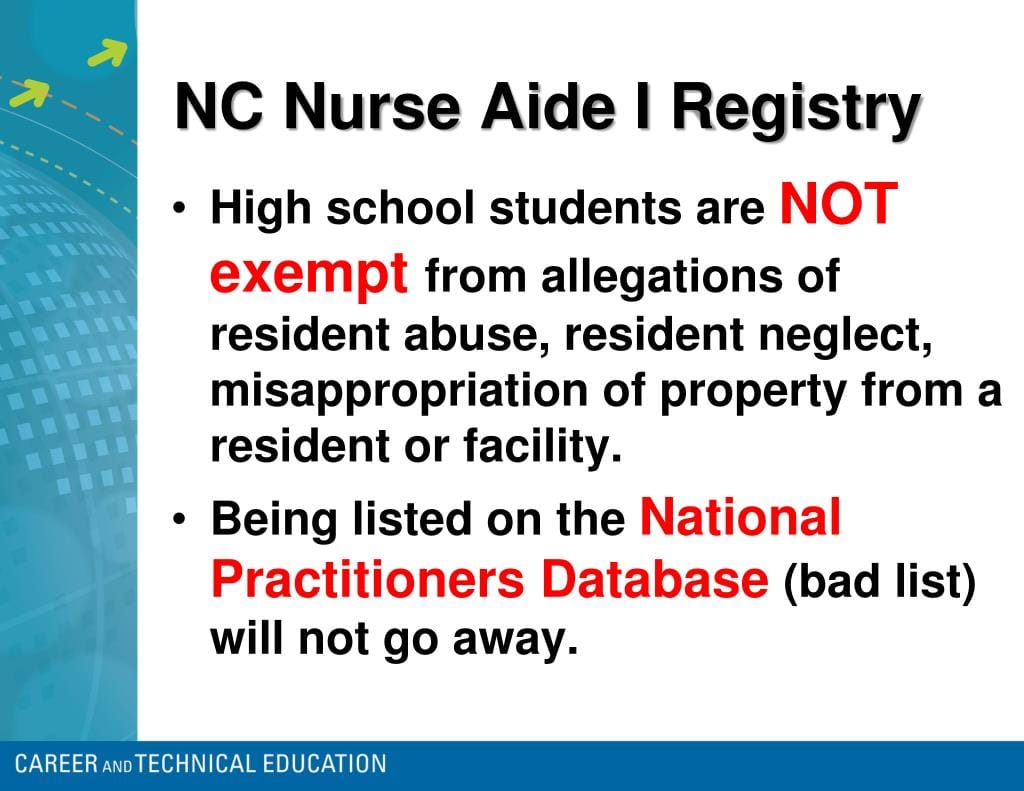This guide provides comprehensive information about the North Carolina Nurse Aide Registry (NCNAR), including registration, renewal, verification, and salary expectations for Certified Nurse Aides (CNAs) in North Carolina.
Navigating the NCNAR: Registration
Becoming a Certified Nurse Aide (CNA) in North Carolina involves getting listed on the NCNAR. Here’s a breakdown of the various pathways:
Path 1: Standard Training and Competency Evaluation
This is the most common route to becoming a CNA.
- Training: Complete a state-approved 75-hour basic nurse aide training program. This program covers essential knowledge and skills required for CNAs.
- Competency Exam: Pass the North Carolina Nurse Aide I Competency Examination, which assesses your ability to apply the skills learned during training.
- Registry Listing: You’ll likely be listed on the NCNAR within 10 business days of successfully passing the competency exam.
Path 2: Training Waiver and Competency Evaluation
Some individuals might qualify for a training waiver, though they will still need to pass the competency exam.
- Waiver Application: Apply for a training waiver through the North Carolina Department of Health and Human Services (NCDHHS). Eligibility criteria vary, so consult the NCDHHS website for the latest requirements.
- Competency Exam: Pass the North Carolina Nurse Aide I Competency Examination, just like those completing the standard training route.
- Registry Listing: Successful completion of the exam leads to listing on the NCNAR.
Path 3: Licensed Nurses (RN/LPN)
Licensed RNs and LPNs in North Carolina typically don’t need additional training.
- Request Listing: Submit a request to be listed on the NCNAR based on your active North Carolina RN or LPN license. Check the NCDHHS website for the specific process.
Path 4: Reciprocity (Out-of-State CNAs)
CNAs certified in other states might be eligible for reciprocity.
- Reciprocity Application: Submit a Reciprocity application to the NCNAR. You will probably need to provide documentation of your current CNA certification and verification of good standing from your previous state.
Maintaining Your CNA Listing: Renewal
Keeping your NCNAR listing active is essential for working as a CNA in North Carolina. Here’s how to renew:
Renewal Process (Within 24 Months of Expiration)
- Work Experience Confirmation: Ensure you’ve worked at least eight paid hours as a CNA I in North Carolina within the last two years.
- Information Gathering: Collect your Social Security number, CNA I license number (if available), and the contact information for a Registered Nurse (RN) who can verify your work experience.
- Online Renewal Form: Complete the “Nurse Aide – Online Renewal Form” on the NCNAR website.
- RN Verification: Your RN must complete the “Nurse Aide – Employment Verification Form” online.
- Submission and Processing: Allow approximately 24 hours for processing after both forms are submitted.
- Renewal Status Check: Verify your renewal status on the NCNAR website.
Reinstatement (Expired for Over 24 Months)
Reinstatement requires additional steps, which may include continuing education or retaking the competency exam. Check the NCNAR website for specific guidelines.
Verifying Your Credentials
The NCNAR allows employers and individuals to verify CNA listings.
Online Verification
The NCNAR website provides a simple way to confirm a CNA’s listing status (active, expired, or suspended). This usually includes information like the CNA’s confirmation number and email address.
CNA Salaries in North Carolina
Understanding CNA compensation is important for anyone considering or currently working in this role.
Salary Expectations
- Average Hourly Wage: Around $20.58 (Indeed, 2024)
- Average Annual Salary: Approximately $34,760 (Salary.com, May 2024)
- Typical Salary Range: Between $31,840 and $38,270 (Salary.com, May 2024)
These are average figures, and actual earnings can vary based on several factors:
- Experience: Entry-level CNAs generally earn less than those with more experience.
- Location: Urban areas may offer higher wages than rural areas due to cost of living and demand.
- Facility Type: Hospitals and specialized care centers might provide higher salaries compared to nursing homes or home healthcare agencies.
It’s important to remember that salary data is constantly evolving. Ongoing research may adjust these estimations. This information provides a general overview; individual circumstances may influence actual earnings.
Additional Information and Resources
- Nurse Aide I vs. II: North Carolina has only one level of CNA (Nurse Aide I).
- Out-of-State CNAs: Explore training waiver and reciprocity options.
- NCDHHS Website: https://ncnar.ncdhhs.gov/ for the latest information and forms.
- If you are experiencing a nose bleed, seek medical attention.
- Maintaining a healthy mucogingival junction is important for good oral health.
This guide is designed to be a helpful resource. However, regulations can change, so it’s essential to consult the official NCNAR website for the most up-to-date information. Good luck on your CNA journey!
- Senior at What Age: Benefits & Eligibility Guide - March 29, 2025
- Unlocking Senior Benefits: How Old is a Senior? Your Complete Guide - March 29, 2025
- Master Russian Politeness:A Guide to Saying Please - March 29, 2025
















